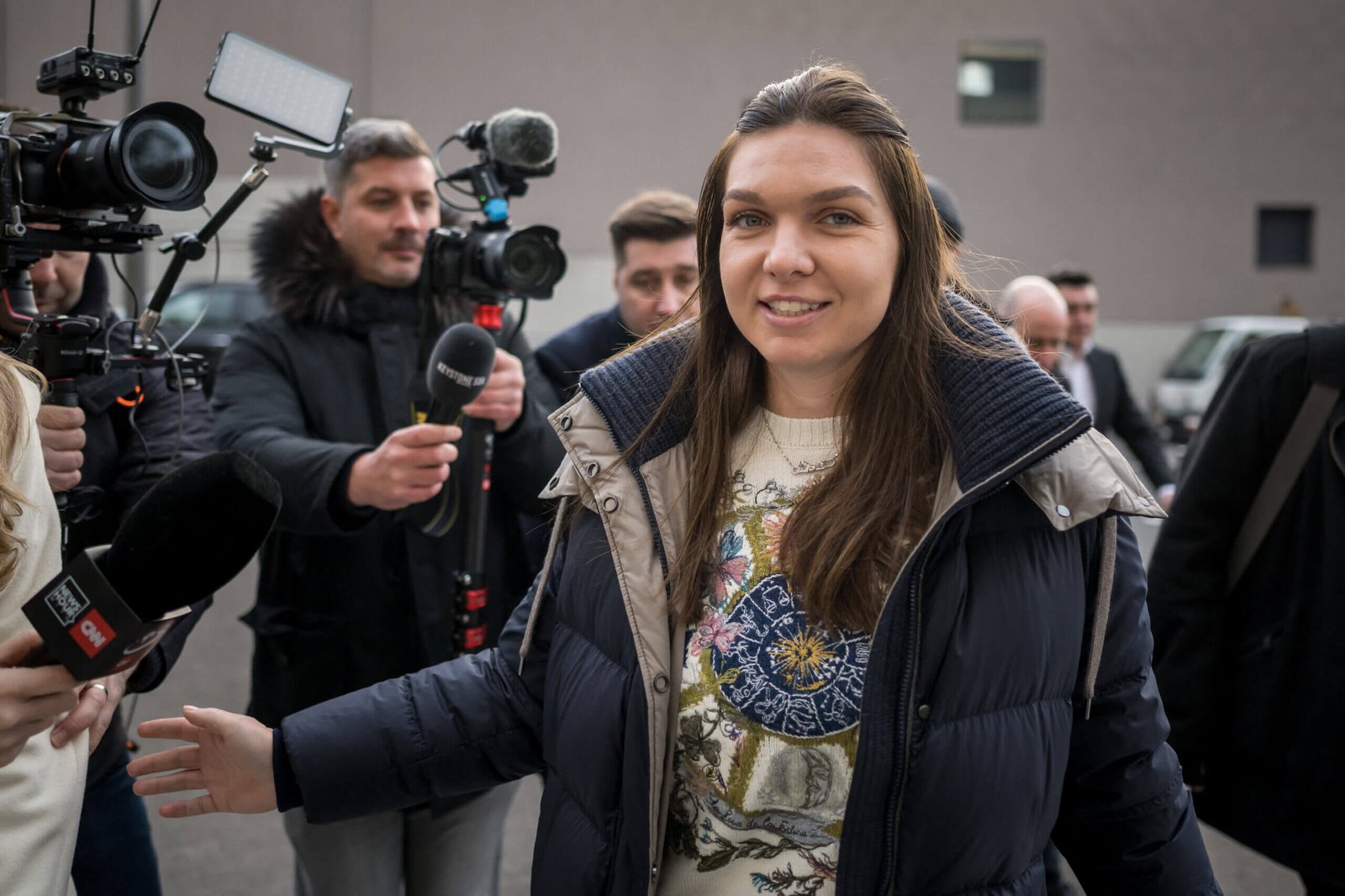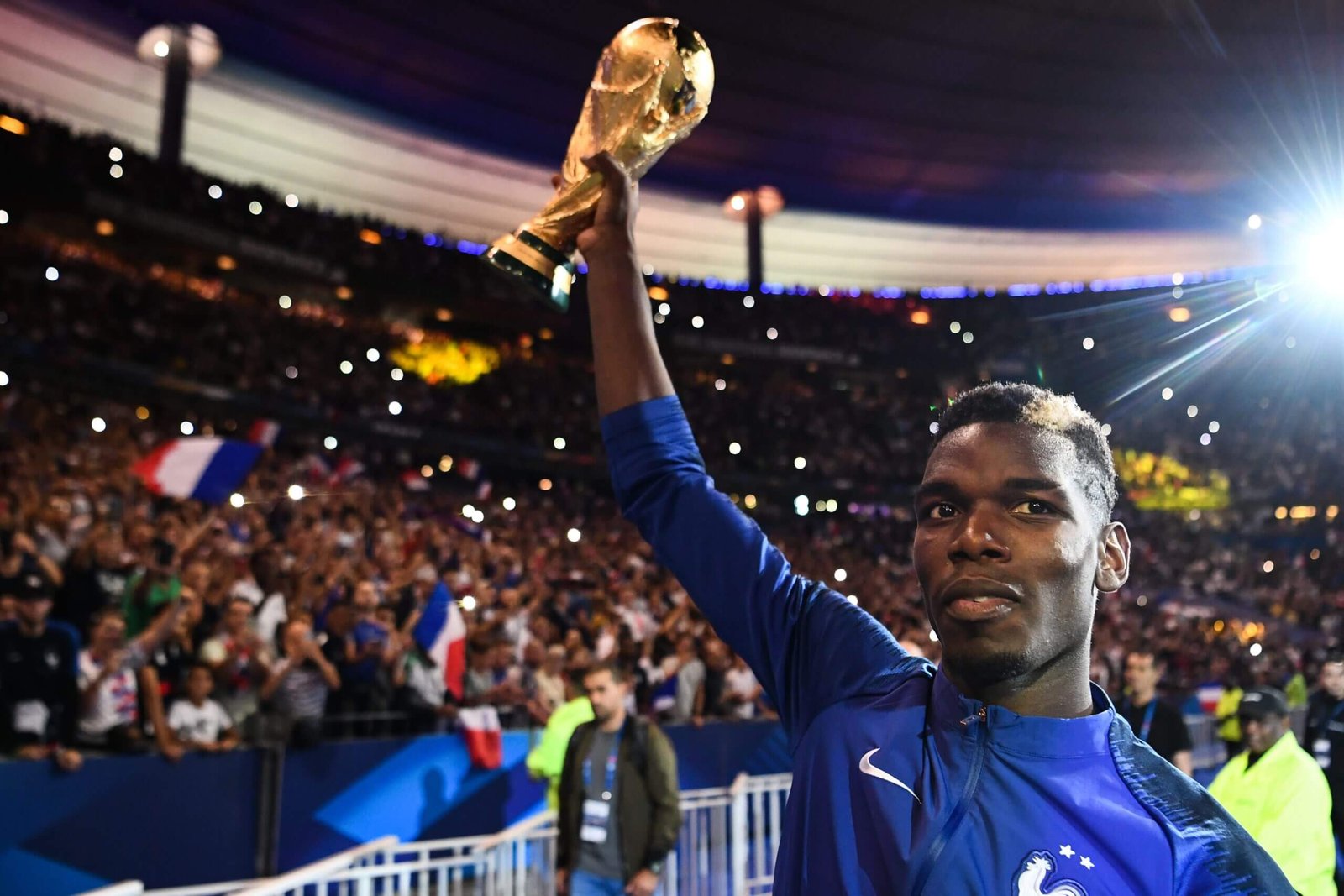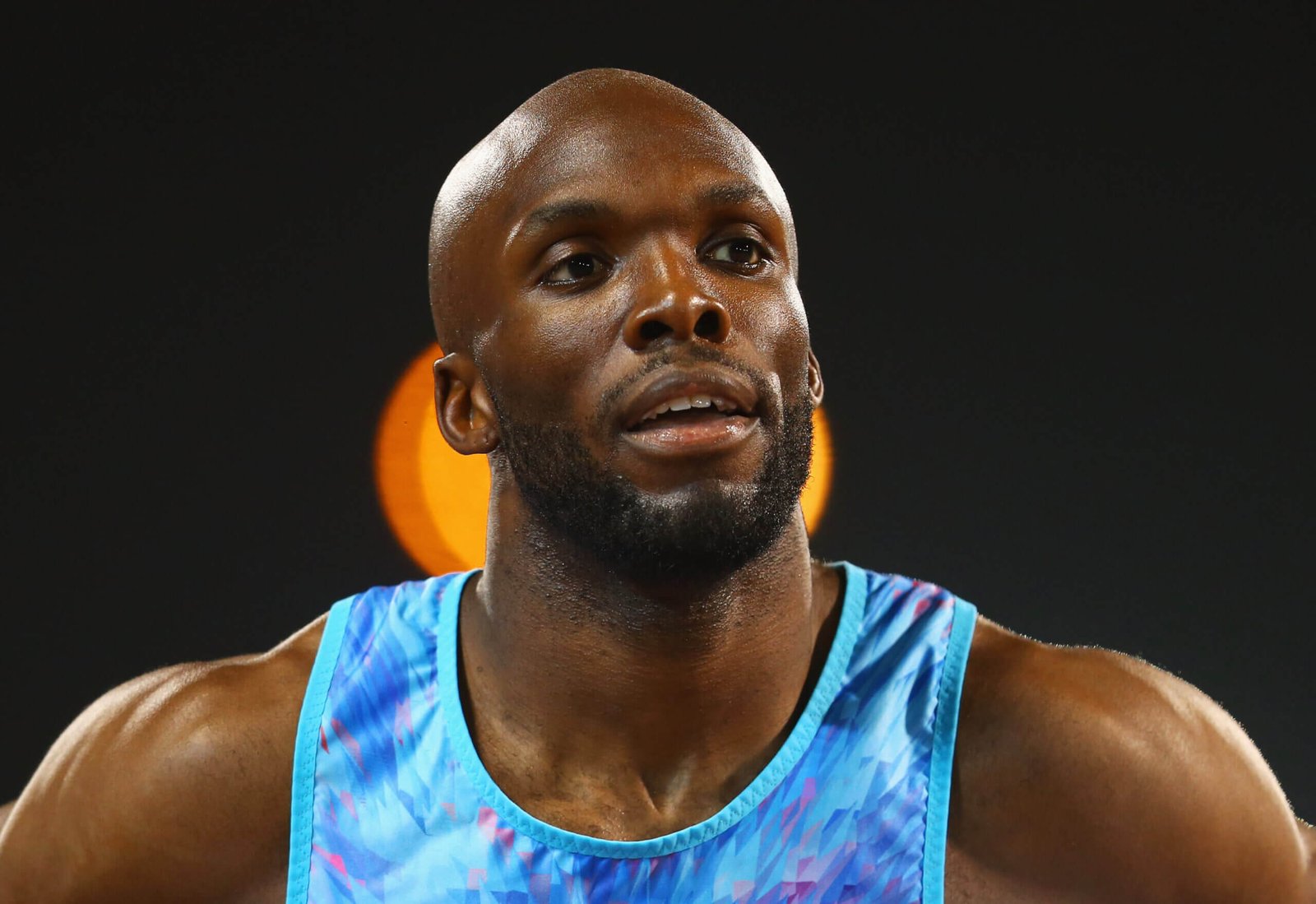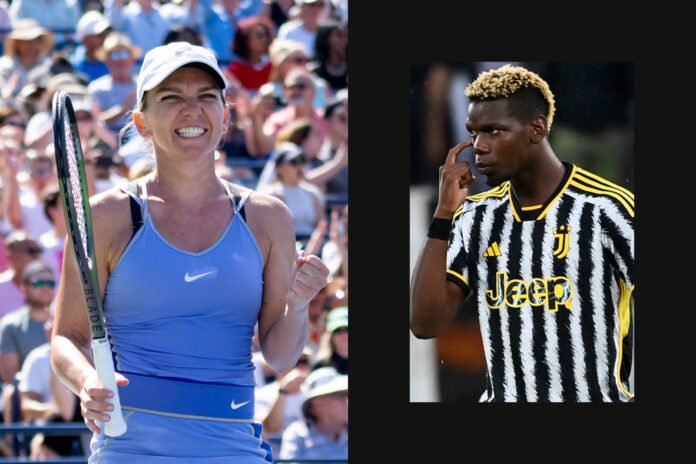Simona Halep, the former Wimbledon and French Open champion, had her doping suspension reduced from four years to nine months earlier this week after a successful appeal at the Court of Arbitration for Sport (CAS).
It was a decision that effectively saved her career.
One interested observer of the Halep case will have been the Juventus and France midfielder footballer Paul Pogba. On February 29, he was suspended for four years by NADO Italia, the Italian Anti-Doping Organisation, following a failed anti-doping test. He called the decision “incorrect” and plans to appeal to CAS.
The severity of a four-year sanction is career-threatening for athletes, especially those already entering the twilight of their playing days. Halep was 31 at the time of her initial sanction. Pogba turns 31 this month. For the former World Cup winner, a four-year ban would render him unlikely to compete again at the highest level.
So, can Pogba take any encouragement from Halep’s successful CAS appeal? And how much does precedent play a role in cases of this nature? The Athletic assesses the situation.
What happened to Pogba?
Pogba was suspended from football for four years after failing an anti-doping test. He was initially handed a provisional suspension by NADO Italia in September after his test, following his side’s 3-0 win at Udinese on August 20, detected testosterone not produced by the body, according to NADO Italia.
In October, the B sample requested by his legal team confirmed the result. Non-endogenous metabolites were detected in his sample, a violation of articles 2.1 and 2.2 of the World Anti-Doping Agency (WADA) code on the presence of a banned substance and the use or attempted use of one. The code, to which NADO and FIFA are signatories, is the definitive anti-doping rulebook.
The substance in question was DHEA (Dehydroepiandrosterone), a steroid precursor.
FIFA’s guidelines for suspensions of players who violate its anti-doping regulations range between two and four years, depending on whether it can be proven that the rule violation was intentional.
Pogba in action for Juventus at Empoli in September (Gabriele Maltinti/Getty Images)
Pogba, who is under contract at Juventus until the summer of 2026, confirmed he would appeal the decision at CAS.
“I have today been informed of the Tribunale Nazionale Antidoping’s decision and believe that the verdict is incorrect,” Pogba said in a statement.
“I am sad, shocked and heartbroken that everything I have built in my professional playing career has been taken away from me. When I am free of legal restrictions, the full story will become clear, but I have never knowingly or deliberately taken any supplements that violate anti-doping regulations.
“As a professional athlete, I would never do anything to enhance my performance by using banned substances and have never disrespected or cheated fellow athletes and supporters of any of the teams I have played for, or against.
“As a consequence of the decision announced today, I will appeal this before the Court of Arbitration for Sport.”
What happened to Halep?
Halep was handed a four-year ban for two intentional breaches of anti-doping rules by the International Tennis Integrity Agency (ITIA) in September 2023. She had been provisionally suspended in October 2022.
But her appeal against the ban was upheld by CAS, reducing her ban to nine months. While the case was not thrown out entirely, CAS ruled that on “the balance of probabilities”, Halep’s anti-doping rule violations were “not intentional”.
The former world No 1 had been charged twice by ITIA. One related to the use of the prohibited substance Roxadust at the 2022 U.S. Open, while the other concerned alleged irregularities in Halep’s athlete biological passport (ABP), which monitors selected variables over time that indirectly reveal the effects of doping.
Roxadustat is commonly used to treat people suffering from anaemia, a condition resulting from a low level of red blood cells, and stimulates haemoglobin and red blood cell production, which assists endurance. Halep stated that the Roxadust entered her body through the consumption of a contaminated dose of the supplement Keto MCT. The supplement had been given to her by her coach, Patrick Mouratoglou.
Halep faced the prospect of not competing until the end of the Grand Slam calendar in 2026 but, on Tuesday, CAS ruled in her favour.

Halep arrives at CAS for her appeal last month (Fabrice Coffrini/AFP via Getty Images)
“Throughout this long and difficult process, I have maintained my belief that the truth would eventually come out and that a just decision would be reached because I am and always have been a clean athlete,” Halep said in a statement.
“My faith in the process was tested by the scandalous accusations that were levelled against me and by the seemingly unlimited resources that were aligned against me. But in the end, the truth prevailed, even if it took much longer than I wish it had.”
Does Halep’s CAS verdict offer any pointers for Pogba?
It is difficult to make too many comparisons between the two cases, not least because we do not yet know the detailed reasonings behind the initial verdict by NADO Italia.
They have 30 days from February 29 to provide them. From that point, Pogba has 20 days to lodge an appeal. For now, all we know for sure about Pogba is that he tested positive and that he denies any wrongdoing.
But, on a basic level, there is some encouragement to be drawn by Pogba at seeing Halep have her ban significantly reduced.
“The obvious thing you can take away from Simona’s case is that, just because the first tribunal says it should be four years, that doesn’t mean they’re right,” says Howard Jacobs, a leading sports lawyer who represented Halep.
“Unless it’s a specified substance, then the burden is on the athlete to prove that the violation was not intentional and a threshold question. For that, you have to prove how the substance entered your system. And if not, how much more difficult does that make it for you to prove that you did not intentionally violate the rules?
“I don’t know the specifics of (Pogba’s) case, so I don’t know if proof of sources is a significant issue or not, but it starts at four years. If you can prove that you did not intentionally violate the anti-doping rules, then it drops to two, then it can be further reduced from two based on showing no significant fault or negligence.
“The range of how low it can go depends on which rule is being applied and the assessment of the breach.”

Pogba won the World Cup with France in 2018 (Franck Fife/AFP via Getty Images)
The timeline may also offer some guidance for Pogba. Halep has missed eight more months than the reduced punishment she ultimately received from CAS (she was provisionally suspended in October 2022).
“If it’s an athlete later in their career, or there’s some significant competition coming up, or if the athlete is making that argument like we did that ‘Look, she’s already served a longer ban than she should have’, then most CAS panels, in my experience, without taking a position at the beginning as to whether the argument is right, will do what they can to get the hearing scheduled as quickly as they can,” adds Jacobs.
“That happened in Simona’s case. I would expect if Pogba and his lawyers are pushing for the hearing to be done quickly, they’ll get a hearing relatively quickly.”
What role does precedent play in Pogba’s case?
The onus is now on Pogba to prove the failed test was not intentional. Legal teams will use precedent as part of their defence, including the verdict handed down to Halep. They are sure to scrutinise the full written reasons relating to her case once they are published by CAS.
Precedent can also play a role in deciding the punishment.
“That’s somewhat unique in international arbitration with sports, as you do have this body of case law,” says Jacobs. “Even though it’s not binding, it’s at least persuasive.
“One of the main purposes of having a World Anti-Doping code that applies to all sports is to have harmonised results. So CAS tribunals generally will follow the precedents. Obviously, every case has its own facts, but for the principles that you’re applying, there’s a pretty extensive body of cases on anti-doping. With the CAS cases — particularly the bigger ones with really prestigious panels — they recognise what they write will guide how tribunals decide cases going forward. So you definitely use the cases (in your defence).”
But with Pogba’s DHEA case, there are a limited number of direct precedents.
“There will be other cases where supplements have been the source and that’s what the code actually talks about: if the athlete can demonstrate the source and that they took all reasonable care to avoid the use of prohibited substances,” says Michele Verroken, founding director of sports business consultancy Sporting Integrity and formerly director of ethics and anti-doping at UK Sport.
“That would be their first tranche of arguments, no doubt. And then you would look at all previous cases, including Halep’s. But there are very few DHEA cases that I am aware of. It isn’t going to be an easy fight.”

The U.S. 400-metre runner LaShawn Merritt (Francois Nel/Getty Images)
One example is that of former American Olympic champion sprinter and 400m specialist LaShawn Meritt.
He tested positive for DHEA in 2010 and blamed it on an over-the-counter supplement to enhance sexual performance. His suspension was reduced from two years to 21 months and he had a ban on participating in the next Olympic Games overturned.
There are other recent football cases that incurred four-year bans, too, albeit they do not involve DHEA.
Bulgaria winger Georgi Yomov, then 25, was given a four-year suspension by UEFA for testing positive for an anabolic steroid after playing for CSKA Sofia in a Europa Conference League game in July 2022. The player blamed his brother, whom he claimed had crushed steroid pills into a shared blender at their parents’ home.
But the CAS panel determined that, “in light of the doubts expressed about the plausibility of the player’s case”, Yomov failed to demonstrate he had taken the steroid unintentionally. As a result, his appeal to CAS was unsuccessful.
FIFA Anti-Doping Report 2023 published ⚽️ ✍️ 👉 https://t.co/YlgjFDRA88 @fifamedia #sportslaw #antidoping pic.twitter.com/p3mz7F0mYt
— CIES (@sportCIES) March 7, 2024
Macedonia midfielder Arijan Ademi had better luck in 2017 when his four-year ban was reduced by two years at CAS. He had tested positive for an anabolic steroid, stanozolol, following Dinamo Zagreb’s 2-1 Champions League win over Arsenal in September 2015.
But the CAS panel accepted part of the player’s argument that the supplement he had been prescribed after injury had been contaminated by a banned substance and that “on the balance of probabilities, the player had no intention to cheat”. He was able to show judges that he had checked the supplement with his club doctors.
Ultimately, though, the relevance of these precedents will depend on the particular circumstances of Pogba’s case. The intricacies of the arguments will only become clear in time.
(Top photos: Getty Images)
Read the full article here


